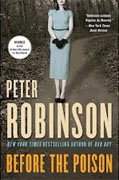Before the Poison
Peter Robinson
book reviews:
· general fiction
· chick lit/romance
· sci-fi/fantasy
· graphic novels
· nonfiction
· audio books
· author interviews
· children's books @
curledupkids.com
· DVD reviews @
curledupdvd.com
newsletter
win books
buy online
links
home
for authors
& publishers
for reviewers

 |
Before the Poison Peter Robinson William Morrow Paperback 368 pages January 2013 |
|
So absorbed was I entering the time vortex of Robinson’s symphonic Before the Poison
Even without this knowledge, the reality of Kilnsgate house is intimidating. Cut off from the world with the nearest neighbors over half a mile away, Chris has a gut-wrenching sensation that he’s an impostor. Only the ethereal tones of Schubert’s third Impromptu and dreams of Laura seem to calm him while outside the wind howls, the rain lashes against the windowpanes, and the house itself groans and sighs with dark secrets and hidden agendas. As an astute composer with a vivid imagination, Chris grows certain that the house is haunted by Grace as he becomes increasingly absorbed in her life, and in her death: “there’s the vague something the feeling that the house had been waiting for me, that it had secrets to tell me.” It is merely by happenstance that Chris stumbles upon this forgotten piece of local history and a court case that once gripped the imagination of the public. Echoing the delicate strains of Chris’s romantic piano compositions, Robinson moves us through the night of Ernest Fox’s poisoning, when Grace may have used the opportunity of a snowstorm to put into action a plan that she had been long devising. We also read of her trial by a jury of morally righteous men unwilling to forgive one they viewed as an "arrogant and detached adulteress." There are also Grace’s journals that record her time working as a nurse in the War, the atrocities she was forced to endure circling around the story in a complex dance that drives Chris and the other characters to the edge. Chris is too besotted to do anything but ruminate on the fate of Grace. Haunted by the ghosts of a murderess and her victim, Chris holds onto his memories of Laura while plunging precariously into Grace’s world of uptight Fifties morality. Far from a crime of passion executed in the heat of the moment, was Fox’s death a coolly thought-out, nearly foolproof way of Grace ridding herself of a husband she had ceased to love? But what if Grace didn't do it? The idea of proving her innocence excites Chris; he just needs to know how and where to look. The snowy winters of Yorkshire perfectly accent the chill of Kilnsgate House with its night noises and a figure who appears in the wardrobe mirror, along with a past that is a far cry from the official version of events. Through Robinson's accomplished hands, we see a man who must come to terms with his own losses while Grace seduces him with her heroic and enigmatic beauty. Originally published on Curled Up With A Good Book at www.curledup.com. © Michael Leonard, 2012 |
|
|
|
 Click here to learn more about this month's sponsor! |
|
| fiction · sf/f · comic books · nonfiction · audio newsletter · free book contest · buy books online review index · links · · authors & publishers reviewers |
|
| site by ELBO Computing Resources, Inc. | |
 After the death of his wife, Laura, it’s time for Chris to begin a new life in England after living for thirty-five years in America. Chris views the move as a unique opportunity,
although he can’t quite explain to his eighty-seven-year-old mother why he’s returning after so long. Although Chris is at first unaware that Kilnsgate House has a history--which soon comes to obsess him--local estate agent Heather Barlow, “clearly adept in the art of omission,” fails to tell him that back in 1953, the owner of the house, local GP Ernest Fox, was poisoned by his beautiful wife, Grace. Later Grace was hung, her sentence largely
the verdict of the court of public opinion.
After the death of his wife, Laura, it’s time for Chris to begin a new life in England after living for thirty-five years in America. Chris views the move as a unique opportunity,
although he can’t quite explain to his eighty-seven-year-old mother why he’s returning after so long. Although Chris is at first unaware that Kilnsgate House has a history--which soon comes to obsess him--local estate agent Heather Barlow, “clearly adept in the art of omission,” fails to tell him that back in 1953, the owner of the house, local GP Ernest Fox, was poisoned by his beautiful wife, Grace. Later Grace was hung, her sentence largely
the verdict of the court of public opinion.